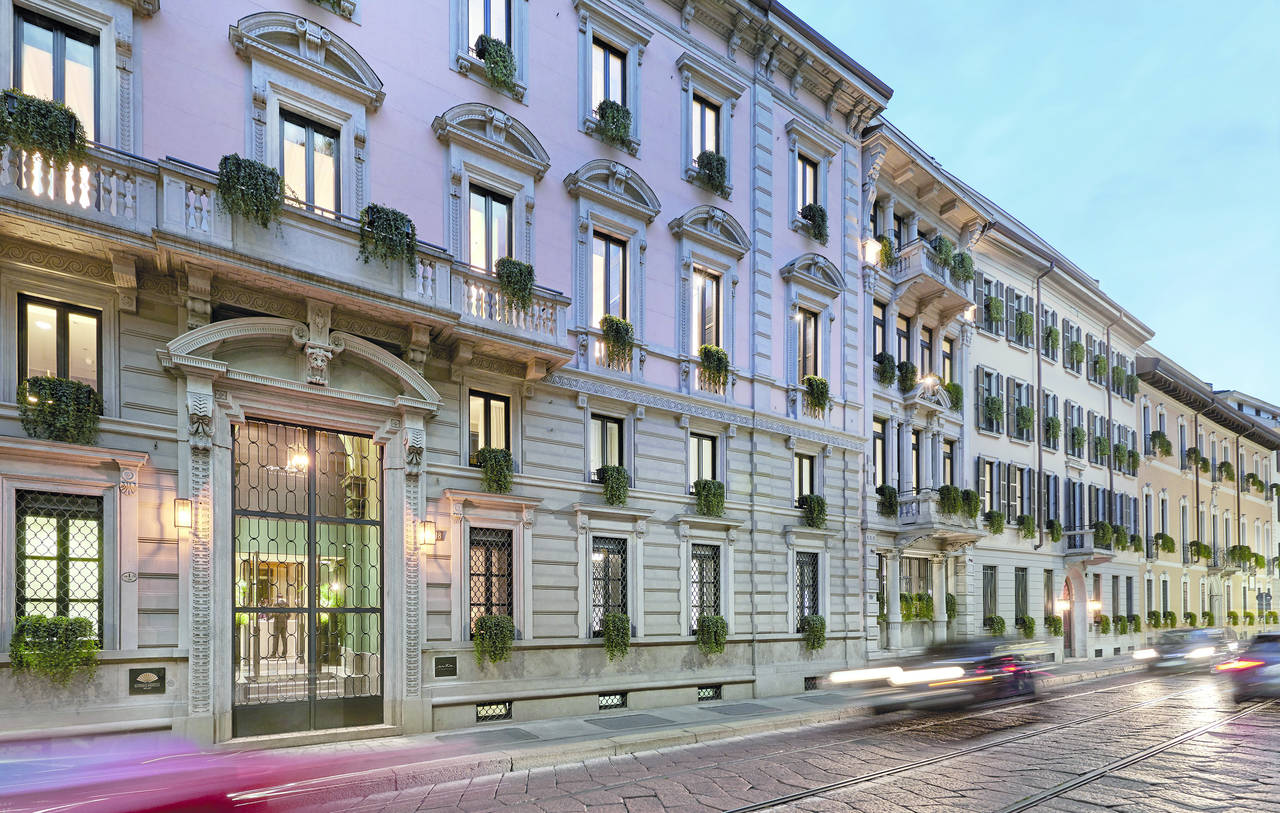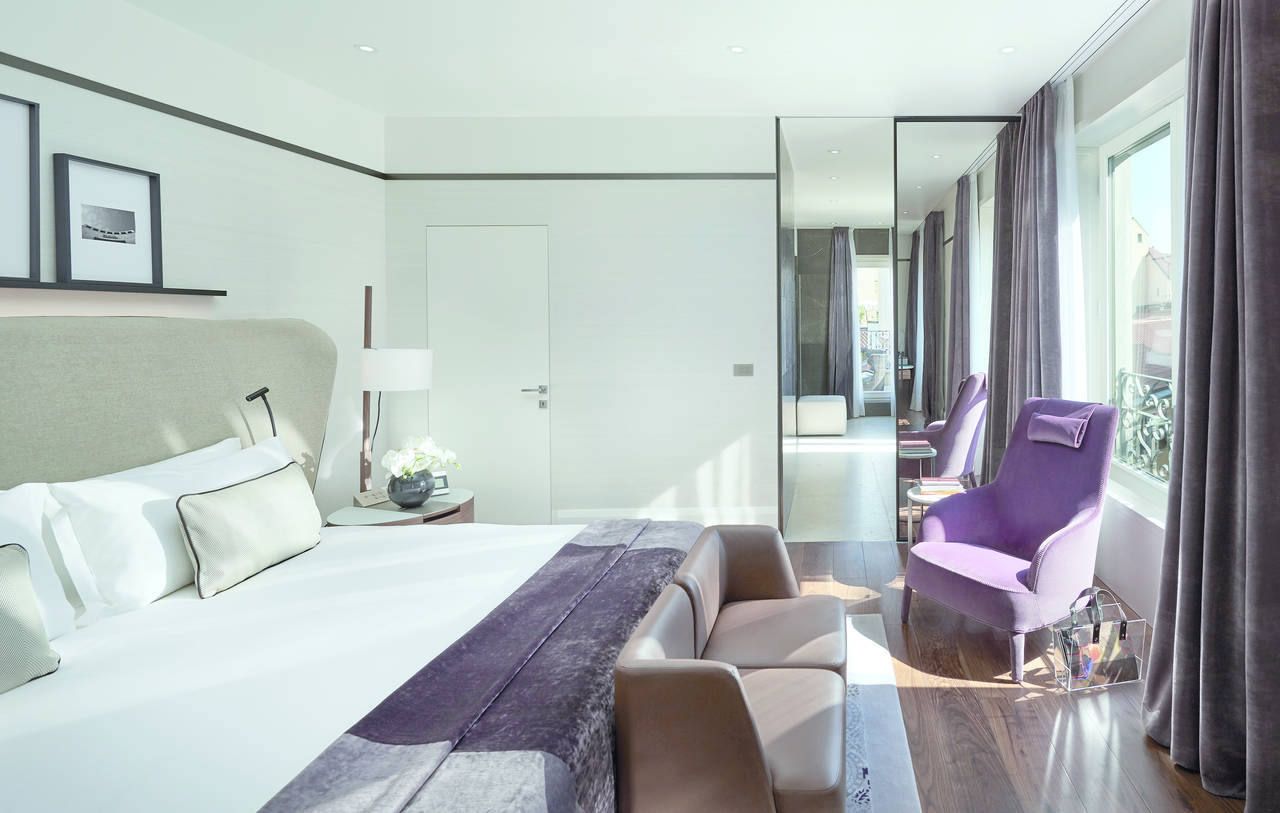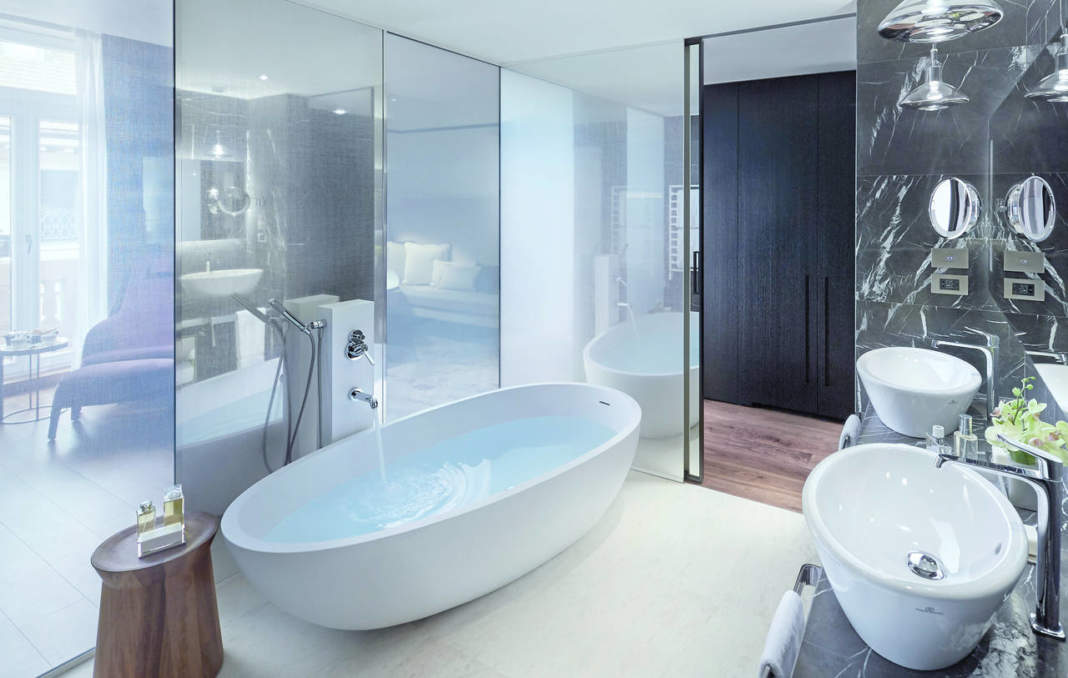An idea: recreating a Milanese residence with Oriental contaminations, drawing on the details of a luxury hotel chain that operates 45 hotels in 24 different countries; a five-star luxury hotel designed by Antonio Citterio and Patricia Viel, an important part of which is use of materials of outstanding quality, with an obsessive focus on refined, precious details. The Mandarin Oriental hotel in Milan is the product of renovation and conversion of four adjacent 18th century buildings, which now contain 104 hotel rooms of 14 different types as well as a restaurant, bar and fitness area. The common thread running through the entire project is marble, in a range of colours recalling the Milan of the 1940’s. This is the context of Mandarin’s partnership with Rimadesio, which supplied fixed and mobile partitions for the hotel rooms. Fixed glass panels were created using an innovative technology involving stratification of LCD (liquid crystal) film through which an electrical impulse passes, changing the glass from transparent to opaque in response to the need for privacy. Used to define the wellness and bathroom space in the deluxe and superior rooms and in all the suites, the partitions alternate stratified glass painted on the reverse to match samples using the Ecolorsystem technology with customised patterns etched on the outside of the glass. The bathroom doors are sliding Velaria panels with a mirror finish, with an anodised profile made to match samples. Lastly, extra-light structural glass railings 12 mm thick surround the staircases leading to the wellness and bathroom area in a number of suites. We discussed these themes with Rimadesio Contract Manager Fabrizio Gregori and Giuseppe Bavuso, the designer who created Velaria and has always been the creative mind behind all Rimadesio products.

Area: Rimadesio's participation in the Mandarin Hotel project revealed all the qualities and potential of the company's Contract division. How did you approach the project, and what were the most interesting challenges that came up while it was under way?
Fabrizio Gregori: The Contract division provides the architect and the client with all the know-how of a company specialising in two materials: glass and aluminium. As always, Rimadesio's approach is highly technical, and when asked to do so, the company provides a highly customised product using glass and aluminium with innovative technologies that make the manufacture and therefore the project truly unique. In the case of the Mandarin Oriental, we needed to create an architectural diaphragm made of glass to separate the bathroom and wellness area from the bedroom. All with aesthetic rigour and use of advanced solutions rarely found in luxury hotels.
Area: You came up with a number of different types of elements for this project. Which did you create specifically for the project, and in which cases did you rework standard products in response to the customer's specific requests?
Fabrizio Gregori: Our approach to working on the project with Antonio Citterio and Patricia Viel and Partners was divided into two phases. In the first phase we created fixed stratified and tempered glass panels with different finishes and thicknesses. The concept involved alternation of clear decorated panels with panels that were painted on the back, with decorations that would define the bathroom space and separate it from the rest of the room.
In the second phase the challenge was to allow the glass to remain opaque or become transparent, allowing light through, as required. And so we engineered fixed panels lined with a film that uses liquid crystal technology in which an electrical impulse makes the surface go opaque when required for privacy. It's important to note that all the components were made in Italy, and the glass permitted customisation of thickness and therefore of the final effect.
The installation method involved setting the glass into both the floor and the ceiling and managing the electrical wiring in coordination with the on-site technicians, confirming the organisational skills of our Project Managers, who were there all the time and ready to face the challenge. To complete the project, we worked with the studio on sliding doors for accessing the wellness and bathroom area incorporating Velaria sliding panels, made to measure, making them particularly useful for hotel guests as they had a mirror finish on both sides. The Velaria project, a Rimadesio bestseller, is based on patented mechanisms and components such as inset tracks and profiles designed to make the system silent to slide and easy to install in a false ceiling.
Area: In the Mandarin Hotel project in Milan you also used Rimadesio's Velaria. What are this product's aesthetic and functional qualities, and why did you decide to use it here?
Giuseppe Bavuso: Velaria is a minimal door which is elegant and absolutely light in appearance, making it a flexible product that can easily be incorporated into even the most complex project.
Area: How was Velaria customised for the project? Colours, finishes, custom sizes…
Giuseppe Bavuso: Velaria, like all Rimadesio products, is always custom-made, choosing among the many finishes, glasses and colour variants Rimadesio offers. In this specific case, a custom version was produced in response to Antonio Citterio's request, requiring technological research on the part of the company. Velaria is made here with a liquid crystal film that can transform the glass from clear to matt and vice versa with a single click.
In actual fact, in the Rimadesio products I design, the fact that they are destined for the contract industry does not affect the product concept, which is created with the idea of versatility and customisation in mind, whether it is for a private client or for the contract industry.

Area: Ecolorsystem technology allows you to customise the colour of glass and frames with a very specific coding system. Without neglecting sustainability. How did the system help you in this project?
Fabrizio Gregori: The term Ecolorsystem sums up the result of years of research: before it was fashionable, we wanted to achieve the goal of using water-based and solvent-free paints to finish glass with an infinite range of customisations. This meant we needed to install unique painting systems in the company specially designed to allow Rimadesio to offer a flexible range with brief production times. All while protecting the environment and factory workers' health, allowing architects to create truly unique products for their work in a very short time, qualifying the company with a unique approach to the contract industry and the world of interior design and architecture.
Area: Does the fact that all Rimadesio's production processes take place in Italy add value? In the contract industry, we know that service is just as important as the product. How does Rimadesio meet this need?
Fabrizio Gregori: Direct management of the technical aspects of production permits impeccable quality control. This is what the term "made in Italy" signifies: quality. We handle 90% of aluminium and glass working processes in-house, and we have just installed a unique new system that will further add to this percentage. When you control purchasing, processing and assembly, as well as packaging, you can guarantee that your customer will get constant high quality with super-competitive production times in comparison with the average in the sector.
The team that has been serving customers in the contract industry for years has roots in architecture and design, which, combined with their management skills and experience in sales, make them highly successful in all kinds of tasks. And we ought to note that Rimadesio Contract doesn't work with a turnkey approach but supplies a product, which is therefore based on an idea or on a standard product which is customised with a high degree of design content.
Area: What kind of dialogue is established between the overall mood of the project and the customised elements that are incorporated in it? Was this kind of harmony achieved in the Mandarin?
Giuseppe Bavuso: A fluid dialogue. It's all about simplicity, the essential, elegance and great compatibility.




